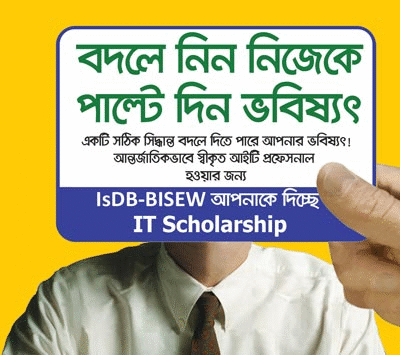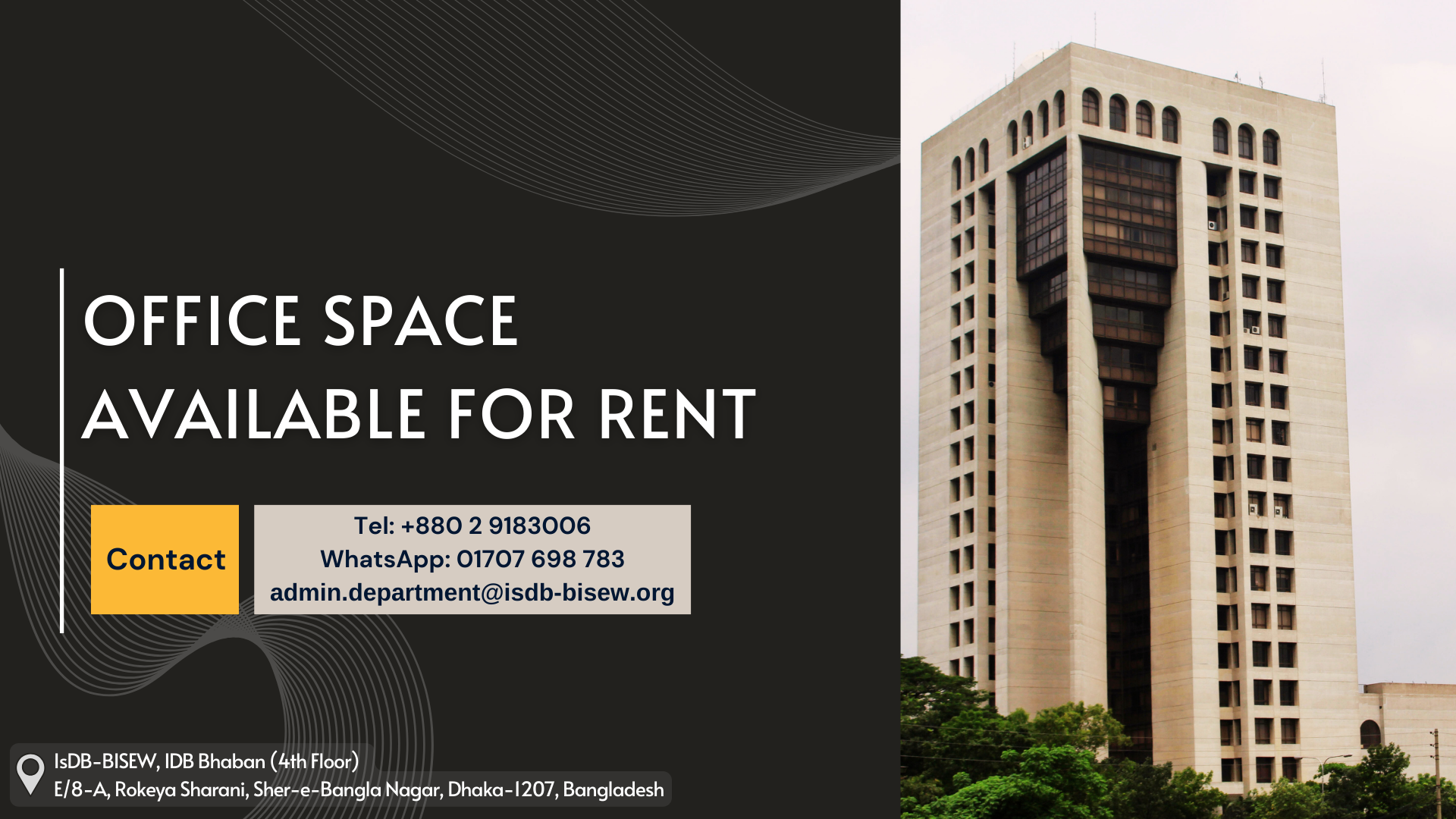Bi-monthly news update from IsDB-BISEW IT Scholarship Programme (January 2020)
Jan 08, 2020 / IT Scholarship ProgrammeEmpower

Welcome to the January 2020 issue of Empower, a periodic newsletter of the IsDB-BISEW IT Scholarship Project. This edition of the newsletter presents the concluding part of a two-part series that describes the exciting opportunities made available by IsDB-BISEW for graduates from any discipline to convert to a career in software development. For learning about the IT Scholarship Programme, visit www.isdb-bisew.org.
A Career in Software Development through the IsDB-BISEW IT Scholarship Programme

IsDB-BISEW graduate Shamim Ashrafi, Big Data Consultant, Amazon.com, USA
The IT Scholarship Programme is an IT training programme that includes professional-level training courses on programming skills that employers look for. Intensive training programmes convert graduates coming from non-IT background into internationally competitive software developers.
Software development courses in the IT Scholarship Programme enable students with little or no programming proficiency to focus on the most important aspects of programming and immediately apply their new coding skills to solve real-world problems.
The goal of many candidates of the programme is to transition into a career in programming and web development. They do this by learning to build applications at a professional level - which provides the foundation they need to build production-ready applications and demonstrate they have the skills to add real value to a potential employer.
Why Learn Software Development in the IT Scholarship Programme ?
We live in a world where technology is continuing to evolve. Technology is drastically changing how we do everything in our lives. It’s more common than ever to get around using Uber or Pathao, technology driven transportation companies. Services like bKash and Rocket are changing how we pay for things. It seems every industry is being radically impacted by how technology is shaping the world around us.
Software is taking over the world. This shift changes how we live our lives, but also requires employees with software engineering skills capable of building the technology that we all use.
Attending a software development course in the IT Scholarship Programme is a viable path to transition into a career in software development as an alternative (or supplement) to graduating with a 4 year degree in Computer Science to helping fill the need of skilled software engineers in industry.
How the Training Courses Work
Courses under the scholarship programme last anywhere from six to twelve months. Given the condensed time frame of training, it is critical that these education programs are designed around two core pillars: speed and high-impact learning. Let's look at why both of these are critically important.
Speed
Most computer science students spend 4 years completing their degree. Computer Science degrees includes classes on wide range of topics relevant to computing. Most students will take classes on programming and software development. In addition, when taking a four year degree, there are many classes on topics like operating systems and computing theory that are helpful for understanding the topic in academia, but that are disconnected from the daily life of a software developer in the real world.
The IT Scholarship Programme isolates the most relevant skills from a 4 year degree and infuse it with relevant industry skills to bridge the gap between the theoretical world of academia and the real world that meets the current needs of the industry.
Despite the two programs being different, both a four-year degree in Computer Science and graduating from the IT Scholarship Programme can provide a viable path to starting a career as a software developer.
High Impact Learning
The IT Scholarship Programme focuses on high-impact learning and teaches only the skills that will prove to be most relevant in the real-world. The various courses in the programme focus intensely to skill the trainees up with exactly what they will need to be successful developers in the professional world. This is accomplished by project-based learning. All trainees in the programme are required to complete multiple software projects of varying size and complexity.
The duration that the trainees attend the IT Scholarship Programme is relatively short when compared to traditional training with a four-year degree from university. In order to make this work, all non-essential skills are ruthlessly cut from the curriculum.
This means that the courses in the IT Scholarship Programme are ideal for people who want to obtain the technical skills that will help them become employable , but to also do so in a very short time frame.
The Latest Technologies
Besides speed and high-impact learning, IT Scholarship Programme courses teach the latest technical skills that closely match the technologies that the best software companies at home and abroad are using to build and launch products.
Let's look at the technologies that courses in IT Scholarship Programme teach and established software companies and startups are looking for.
Programming Languages

One of the most critical components of a developer’s toolkit is the programming language the developer chooses to work with. On the one hand, there are many programming languages out there, and picking the right one can feel intimidating. It’s important to take into consideration that once you learn your first coding language, additional programming languages will be easier to pick up if you’ve taken the time to learn strong foundational programming skills. In this section, we’ll give you an overview of common programming languages included in the IT Scholarship Programme courses, why they are used, and help you understand their value in your programming journey.
C#.NET and the .NET Framework (Course: Enterprise Systems Analysis & Design with C#.NET)

Companies/Organizations: US Federal Government, StackOverflow, Intuit, Olo
C# (pronounced see sharp) is an elegant and type-safe object-oriented language that enables developers to build a variety of secure and robust applications that run on Microsoft’s .NET Framework. You can use C# to create Windows client applications, XML Web services, distributed components, client-server applications, database applications, and much, much more. C# was designed by Anders Hejlsberg around 2000, and its development team is currently led by Mads Torgersen.
C# is modern and easy to learn
A modern language is one that supports the latest features for developing scalable, reliable, and robust industry standard software applications. The C# language supports everything modern programmers need in a language.
C# is an object–oriented language
It supports all the basic object-oriented language features including encapsulation, polymorphism, and inheritance.
Besides common data types, C# also supports modern complex data types and features such as partial classes, extension methods, anonymous types, lambda expressions, asynchronous programming, and tuples.
C# is safe
C# is a type safe language. All variables and classes in C# are a type, and all types are derived from the object, the object type, and are type safe.
Automatic memory management with the help of the garbage collector makes sure that program does not leak memory and automatically manages life cycles of objects and releases once objects are not required.
C# is versatile
C# is the most versatile programming language. Not only can you build Windows client applications, but you can also use C# to build Web and mobile apps.
C# can be used to build:
- Windows client applications using Windows Forms, WPF and UWP.
- Web applications with ASP.NET and ASP.NET Core.
- Native iOS and Android mobile apps using Xamarin.
- Libraries, components, and console applications
- Cloud and Azure apps
- Blockchain apps
- Interoperability, data, and integration services
C# is fast, open source, and cross platform
C# and .NET Core 3.0 are one of the fastest platforms among all software development platforms. C# compiler has been optimized from the ground up.
C# is an open source programming language. The language compiler is available on Github.
C# supports native mobile apps
Mobile developers can build native iOS, Android, and UWP apps using C# and Xamarin. Xamarin also supports Mac and Linux.
PHP (Course: Web Development with PHP and Frameworks)

Companies/Organizations: Facebook, Yahoo!, Wordpress
PHP is one of the most widely used server side scripting language for web development. Popular websites like Facebook, Yahoo, Wikipedia etc, are developed using PHP.
PHP is so popular because it's very simple to learn, code and deploy on server, hence it has been the first choice for beginners since decades.
What is PHP?
This course opens a window for a person to launch a career as a freelancer. PHP stands for Hypertext Pre-Processor. PHP is a scripting language used to develop static and dynamic webpages and web applications. Here are a few important things you must know about PHP:
- PHP is an Interpreted language, hence it doesn't need a compiler.
- To run and execute PHP code, we need a Web server on which PHP must be installed.
- PHP is a server side scripting language, which means that PHP is executed on the server and the result is sent to the browser in plain HTML.
- PHP supports many databases (MySQL, Informix, Oracle, Sybase, solidDB, PostgreSQL, Generic ODBC, etc.)
- PHP is open source and free.
Easy to begin with
Beginners find it very easy to start with PHP. All you would need is a few PHP tags in the present HTML files and upload them to server. Features like dynamic typing and associative arrangements make things extremely easy for you.
Extremely user-friendly
You do not require compiling PHP. All you need to do is simply write the script and upload it to the server and then to the browser.
Inbuilt database Support
PHP is integrated with support from most popular databases such as MySQL. You may start using databases without the installing drivers. PHP gained a lot of success owing to the web based admin tool, PHP My Admin.
Economical Hosting
Since the language is so widely accepted, there is certainly no hassle in looking for hosting for PHP. It has been around for such a long time and is amiable with Linux as well as Windows.
Other Technologies Taught
Apart from programming languages, many other technologies and tools are taught. These include:
- Object-Oriented Analysis and Design
- Web Development Frameworks
- Databases
- JavaScript Libraries
- Version Control
- Servers & Hosting
There's a lot to learn!
Getting professional-level development skills takes a lot of work and there are many different skills that are important to learn!
Regardless of the course you are assigned in the IT Scholarship Programme it is important to know that as a professional developer it is important to have certain skill sets. Things like: a programming language, a web framework, experience with server and hosting functionality, and databases are all important skills to learn. Within each of these categories of technologies there are specific technologies, each with trade-offs and benefits both for and against them.
Does this sound like a big commitment to you? If it does I don’t blame you. Luckily, when learning a skill as complex as programming, picking up the foundations will set you up better in the long run. Given the programming field changes so frequently, your best bet is to focus your energy on understanding the programming concepts that will withstand the test of time.



